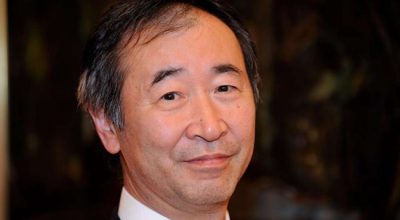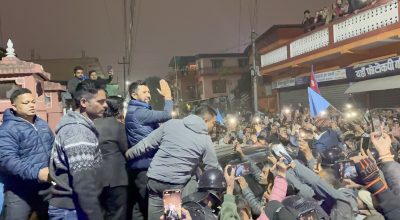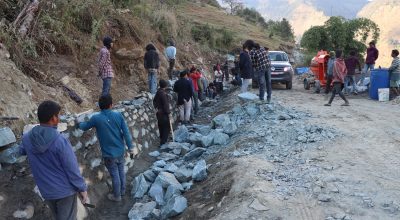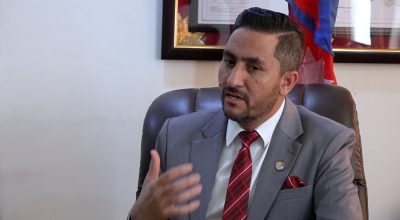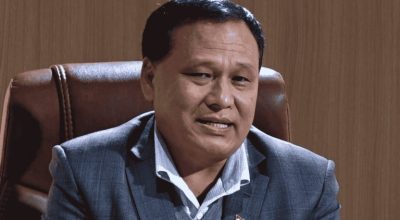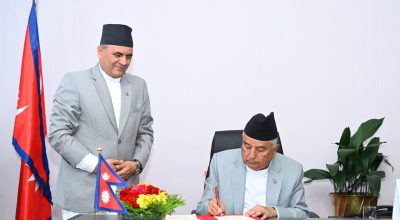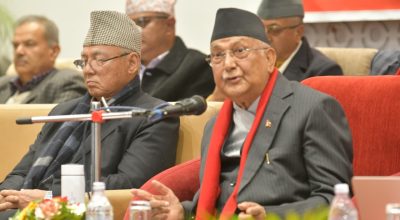
Kathmandu, Feb 19: Democracy Day is celebrated as the National Day every year on the 7th of the Nepali month Fagun.
It commemorates the day on which the nearly 104-year-old autocratic Rana oligarchy was overthrown and democracy established through a people’s revolution. It was the day when the Nepali people secured their civic rights and freedom of speech, expression and right to organize and live a free life. This was also the day when the process of ensuring the rule of law was initiated.
In an interview to RSS Senior Executive Editor Krishna Adhikari and Reporter Kalika Khadka, in the context of the Democracy Day today, Minister for Communications and Information Technology, Prithvi Subba Gurung, underscores on keeping alive the significance of the National Democracy Day, recalling it as an important campaign to establish the basic tenets of democracy.
He said the government was committed to the holistic development of the media sector by amending, revising and updating the existing laws so that the spirit and essence of federalism would be felt at the local level through timely reforms to the past laws related to it.
The Communications Minister also called for positive cooperation from all the stakeholders involved in the media sector to discourage the dissemination of disinformation, anomalies and misinformation, and the spread of social enmity in the Nepali media sector. The following is the excerpt of the interview with Minister Gurung, who is also the government spokesperson:
1. The nation is celebrating Democracy Day, what message does this day give to the countrymen?
– The National Democracy Day became overshadowed over the past years. The four great martyrs hit at the heart of the entire feudalistic autocracy through the political mass awakening movement. That was the proud and historic narrative and this needs to be highlighted. It was a milestone campaign for establishing the basic norms and values of openness and democracy in the Nepali society. Therefore, the government has decided to celebrate the Democracy Day as a national festival in a grand and enthusiastic manner.
Q. Democracy is the highest form of political system for taking the State’s services to the people. However, there is public complaint that that the people have not been able to adequately experience it. What is the government’s take on this?
– From the viewpoint of political theory and ideology, the federal democratic republic is the best system for service to the people, the nation’s transformation and good governance. This is theoretical matter. We have formed three-tiered government as per the constitution. The local government is for delivering service to the people, the provincial government is for managing production and employment and the federal government is for expanding national and international relations and formulating policies.
Democracy was ushered in the country with the termination of the feudalistic rule in 1991. There was some change, politically, but the people’s economic and social development has not been achieved yet. Still many Acts and laws date back to the Panchayat-era. Talking about the Ministry of Communications and Information Technology, the Press Council Act, 2048 had been enacted. The Telecommunication Act was amended in 2053 BS. The democratic republic was established with the People’s Movement II in 2006-2007, but many new Acts and laws are yet to be enacted in alignment with the federal democratic republic even after 10 years since the political change. This is where the political parties representing in the parliament have failed to fulfill their responsibility of enacting laws in deference with the new dispensation.
People do not get to experience the change until the Acts and laws that have hindered in the promotion of good governance are revised. Therefore, the present government has brought six ordinances related to the promotion of good governance and to public service delivery. This creates an easy and convenient environment for providing efficient service to the people. The government has the desire to take the country towards the path of prosperity through development and good governance.
2. The Press and democracy are complementary of each other. What is the government’s view regarding a free Press?
– The incumbent government is formed by the parties that have struggled for press freedom. The recently-formed parties do not know much about the older parties. There is no way the present government which is committed to press freedom introducing any laws to restrict the people’s freedom of speech. There are laws to regulate the traditional media, but we lack laws for the operation of new media including the social networking sites. We have only tried to make the press freedom and freedom of expression more systematic through the ordinance related to social sites. Only doing so will make the democracy stronger and ethical. This ordinance has been brought to build a civilized society. Anarchy does not make democracy stronger. The government is for press freedom, ensuring people’s right to information and for freedom of speech.
3. What is the government’s official viewpoint regarding the bill on social networking sites that has been tabled in parliament?
– The use of podcast and AI has been increasing with development of information technology. The social sites have not been registered as an industry and business. The social platforms should have been included under the ambit of tax and investment and they should have registered themselves as business enterprises. And this has not happened. There is unhealthy publicity in society, spreading anarchy, bringing unruliness in society- calling this as freedom of expression. This has affected the national unity and sovereignty of the country. There are people following more than 10 religions in our country. Ours is a country having religious tolerance. It is found that from time to time some people are making statements in the social media, likely to bring division even on matters of independence. We have a saying, ‘Janani Janmabhumishcha swargadapi gariyasi’ or ‘Mother and Motherland are superior to Heavan’. The country is the motherland. Culture is also being attacked. The goodwill and harmony subsisting in our country having more than 142 castes is exemplary in the world over. The media that are run in deference to law and standards are seen adhering to religious tolerance. But the social sites do not have any governing laws and systematic standards. There has been this demand from the people’s level itself since some years that the State should regulate the social sites. Therefore, this bill has been brought as it is necessary to make the use and operation of social sites systematic and to regulate them.
4. Rastriya Samachar Samiti (RSS)’s anniversary also falls on the same day the National Democracy Day is marked. How do you see RSS’ works?
– There was an epoch-making political change in the country in 2007 BS (1951AD).It was a social change as well. The State has established institutions like RSS that time. RSS was established for democracy. RSS has a big role and prestige in a democratic society. RSS should take pride to have been instituted on the National Democracy Day. This is a great thing. RSS should work to take its proud history to a high point.
RSS’ performance is satisfactory. We are still operating under the law formulated during King Mahendra’s time. RSS is still governed by the law enacted in 2019 BS. There was a change of government after the 1991 political change. But the Acts, laws and policies were not changed. That’s why RSS could not carry out exceptional works.
RSS should be modernized and made technology-friendly as well as the centre of ideal for all. RSS which has collaboration with world’s large news agencies should be made even stronger. This is the State’s asset. RSS should give quality service, which will support democracy.
5. What could be done to make RSS more efficient in the coming days?
– First of all, RSS should amend its Act. It should make timely revision to its Act and Regulations. The old Act is not sufficient to fulfill the present needs. RSS’ structure should also be changed. The managerial system should be rendered up to the mark. Journalists working at RSS should be of the highest caliber. Although it is not possible to reach to the level of foreign news agencies as AP, AFP, PTI, and Xinhua right now, works should be carried out to reach to their level. It is necessary to develop the human resources in tune with the time. It is necessary to produce tech-savvy workforce in the present time. It is also necessary to develop the managerial skills. RSS service can be the best if attention is given to all these things.
6. Anything more to say at last?
– Democracy has played the greatest role for the country to reach to the state of federal democratic republic. The sacrifice made by the four martyrs to bring democracy to the country is of supreme importance. The new generation should be educated on the importance and relevance of democracy. It is necessary that all should know and talk about the dedication and sacrifices made by the four martyrs to bring democracy. We should not forget that it is the contribution of the Democracy Day itself that the country and governance system has reached the present stage. It is necessary to disseminate to the masses through the media the importance of democracy. #nepal #Democracy #rss





